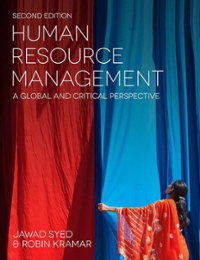There have been on-going debates on the importance of agency and the strategies that women and other
Question:
There have been on-going debates on the importance of agency and the strategies that women and other social groups employ in determining their own career path. Hakim \((1991,1995,2004)\) has argued that agency is central to women's choices in terms of decisions on whether they focus on their job or career or whether they choose to focus on their family. Hakim has been heavily criticised for assuming that everyone can make free choices without acknowledging structural constraints (Devine, 1994; Ginn et al., 1996; McRae, 2003). Later, Hakim (2008) argued that social and family policy must be gender-neutral, but should cater for diversity in lifestyle preferences. For example, Pinker (2008) found that paid sabbatical leave is available to both men and women in Belgium. The sabbatical leave can be used for childcare, further education, or any other purpose. Thus, staff with or without children or other dependants could take advantage of this policy. However, some evidence indicated that the gender-neutral policies may increase differences between working men and women, as men often used this leave to update or extend their qualifications, while women normally used it for family purposes (bid.). Recently, Beddoes and Pawley (2014) conducted in-depth interviews with STEM (science, technology, engineering, and mathematics) faculty members and highlighted a discourse of choice framing the challenges faced by female academics in particular.
On the other side of the debate, some writers analysing women's position in the labour market have focused on the limitations imposed by structures for women's opportunities and advancement (see, for example, Walby, 1983, 1986; Bhopal, 1997). Walby's theory of patriarchy \((1983,1986)\) has been criticised for its indifference to the practices and motivation of individuals. As Collinson et al. (1990: 48) have argued, Walby is 'unable to explain how these social structures are constituted, and this inevitably results in a theory of patriarchy which is heavily deterministic as well as economistic'.
A number of writers have argued that an acknowledgement of the interaction of structure and agency, as well as culture, is needed when examining the impact of gender on employment (see, for example, Devine, 1994; Evetts, 2000) and of ethnicity and gender on career development (see, for instance, Kamenou, 2002, 2008).
Questions
1 In the context of the agency versus structure debate, reflect on key issues discussed in this chapter in relation to WLB. How important to do you think women's and men's choices are in relation to balancing work and life?
2 What would you consider to be the key constraints in taking up flexible working and other WLB initiatives offered in organisations?
3 Do you think there are issues or concerns that may affect some social groups more than others? Extend your discussions beyond a focus on gender, to include other groups such as ethnic minority or disabled groups.
Step by Step Answer:

Human Resource Management A Global And Critical Perspective
ISBN: 9781137521620
2nd Edition
Authors: Jawad Syed, J; Kramar Syed, Robin Kramar





